Why Is My Bearded Dragon Not Eating? Top Causes Explored
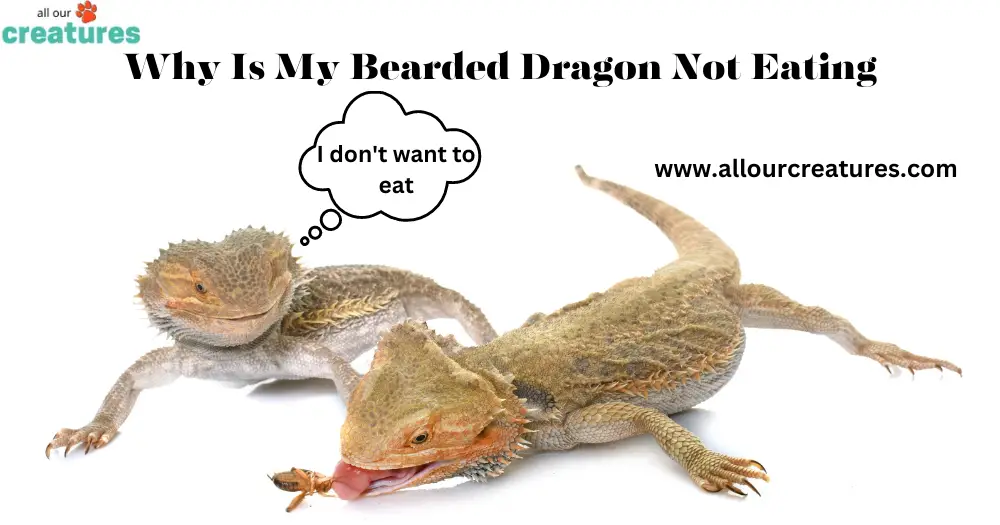
Hey there, bearded dragon enthusiasts! Worried about “Why Is My Bearded Dragon Not Eating?” We’ve all been there—staring at our scaly companions, wondering why they’re not gobbling up their favorite insects or munching on their leafy greens. It can be a bit worrying, but fear not!
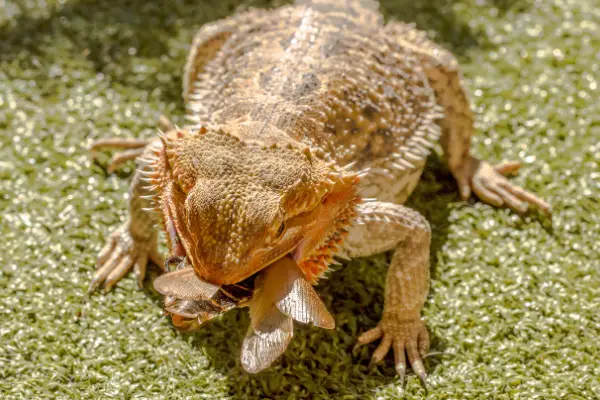
In this informative guide, we’ll delve into the common reasons why bearded dragons may lose their appetite. From environmental factors to health issues, we’ll explore the possible culprits behind your beardie’s eating slump. So, grab a cozy spot and let’s uncover the mystery of “Why Is My Bearded Dragon Not Eating?” together!
Contents
Table of Contents
Why Is My Bearded Dragon Not Eating? Ultimate Guide
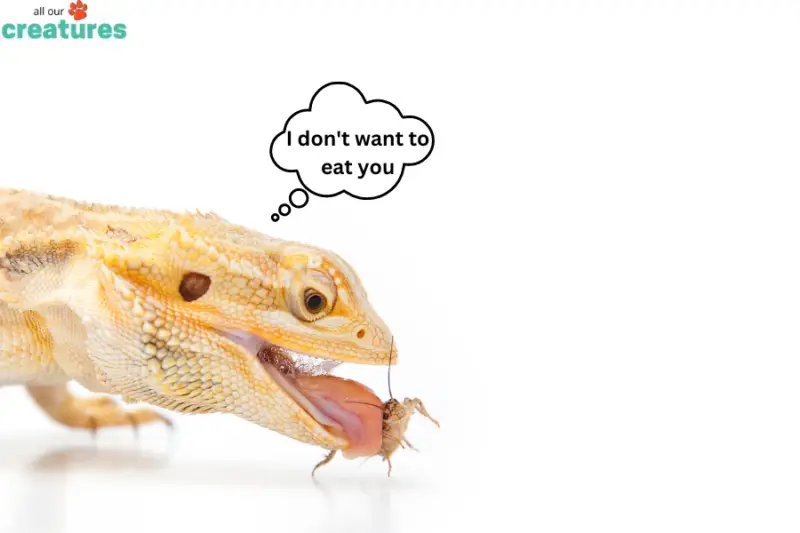
Bearded dragons are popular pets for reptile enthusiasts, known for their unique appearance and friendly demeanor. However, at times, these fascinating creatures may face challenges when it comes to appetite, which can leave their owners feeling anxious and worried.
In this article, we’ll explore some of the possible reasons behind a bearded dragon not eating and provide tips on how to address these issues.
Various factors can contribute to a bearded dragon’s loss of appetite, ranging from environmental stressors to more serious health concerns. The key is to first understand the different causes and then implement suitable solutions to ensure your reptile friend regains a healthy appetite.
Some common reasons include stress, insufficient lighting and temperature, brumation, shedding, and underlying health problems such as impaction or parasites. It’s essential to thoroughly assess your bearded dragon’s environment and behavior to pinpoint the cause and take appropriate action.
As you continue reading, you’ll gain deeper insights into each potential cause of your bearded dragon’s reluctance to eat, along with recommendations on rectifying the situation.
By arming yourself with this knowledge, you’ll be better equipped to support your pet’s well-being and maintain a happy, healthy bearded dragon for years to come.
Understanding Bearded Dragons and Their Eating Habits
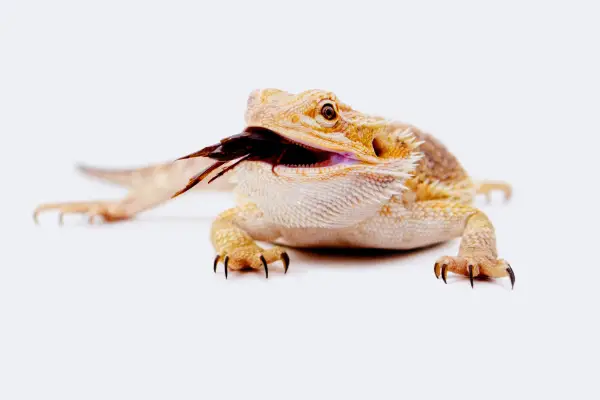
Bearded Dragon Diet
Bearded dragons are omnivores, meaning they eat both plant and animal-based food. A balanced diet for bearded dragons should consist of three main categories: live insects, vegetables and greens, and fruits.
- Live insects: Staple insects in the diet should include crickets, mealworms, and small roaches. Occasional treats can be waxworms or superworms.
- Vegetables and greens: A variety of leafy greens, such as collard greens, dandelion greens, and mustard greens are crucial. Vegetables like carrots, squash, and bell peppers can also be added.
- Fruits: Bearded dragons enjoy fruits like apples, banana, and blueberries, but they should be given in moderation as treats.
Feeding Requirements for Juveniles and Adults
- Juvenile bearded dragons: Growing juveniles need more protein, so their diet should consist of about 80% live insects and 20% vegetables and greens. They should be fed 2-3 times a day.
- Adult bearded dragons: As they grow older, the ratio shifts to 80% vegetables and greens and 20% live insects. Feeding can be reduced to once a day or even every other day, depending on the adult’s size and activity level.
Signs of Health Issues in Bearded Dragons
Several factors can affect a bearded dragon’s eating habits, some of which may be indicative of health issues:
- Stress: Changes in the environment, such as diet, lighting, and humidity, can make bearded dragons anxious and lose their appetite.
- Growing pains: Bearded dragons may refuse to eat when they are growing, as they might not feel well, or they might feel stressed in a tank that is too small for their size.
- Shedding: Discomfort during shedding can affect the appetite of bearded dragons, but it is often a short-term issue that resolves itself.
- Gut impaction: Feeding them insects that are too big (larger than the space between their eyes) may lead to gut impaction, resulting in loss of appetite and possible long-term health issues.
Keeping a close eye on your bearded dragon’s eating habits, understanding their diet requirements, and being aware of potential health issues can contribute to ensuring they have a healthy and happy life.
Common Reasons for Loss of Appetite
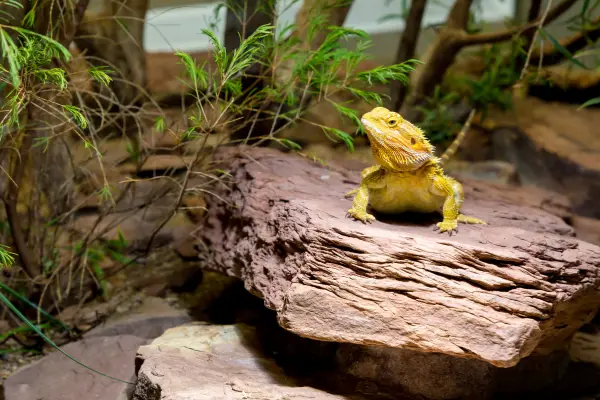
Environmental Factors
One of the primary reasons for a bearded dragon not eating can be improper temperature, lighting, or humidity in their enclosure. Bearded dragons need a specific temperature range and UVB light for proper digestion and appetite regulation.
Low temperatures and dark environments may cause your bearded dragon to lose its appetite, while it’s the opposite for lighter and warmer environments. Additionally, maintaining proper humidity levels can help prevent constipation, which might be caused by low humidity or poor hydration.
Shedding and Growth
Bearded dragons go through shedding and growth phases throughout their lives, which can temporarily affect their appetite. As they grow, their skin becomes tight, and shedding might cause some discomfort that leads to a temporary loss of appetite.
Generally, this phase is temporary; once the shedding completes, their appetite should return to normal.
Brumation
Brumation is a period of dormancy similar to hibernation in mammals. During this time, bearded dragons may not eat or eat very little. This is a natural process, and they will require a cool and dark environment for a certain period.
Lack of UVB light during this period should not trigger any significant health issues, but you should still closely monitor your bearded dragon’s behavior.
Stress
Stress is another factor that could lead to a bearded dragon not eating. Bearded dragons can become stressed due to various factors, such as relocation to a new enclosure or the presence of another bearded dragon. If you suspect stress is causing a lack of appetite, try to identify the cause and make adjustments to help your bearded dragon feel comfortable again.
Health Problems and Illnesses
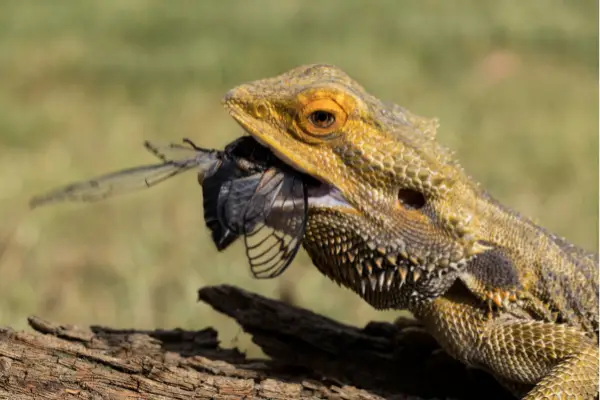
Impaction and Constipation
Impaction and constipation are common health issues that can cause a bearded dragon to stop eating. Impaction occurs when your dragon’s digestive system is blocked, often due to ingesting large, indigestible materials such as substrate or improper food items.
The lack of appetite is a result of the discomfort and inability to properly digest food. Constipation, on the other hand, is a less severe condition but can still cause discomfort and lack of appetite.
To prevent impaction and constipation, ensure your bearded dragon has a proper diet, hydration, and a suitable substrate in its enclosure. If your dragon is experiencing either of these issues, consult a veterinarian for proper treatment.
Infections and Parasites
Infections and parasites can also contribute to a bearded dragon’s loss of appetite. Bacterial, viral, or fungal infections can affect multiple areas of a dragon’s body, such as its mouth, respiratory system, or gastrointestinal tract. Additionally, internal parasites like coccidia can disrupt nutrient absorption, leading to a loss of appetite.
If you suspect your bearded dragon has an infection or parasites, it’s crucial to visit a veterinarian for proper diagnosis and treatment.
Vitamin and Mineral Deficiencies
Vitamin and mineral deficiencies are another potential cause behind a bearded dragon’s loss of appetite. UVB lighting is crucial for dragons to synthesize vitamin D3, which aids in the absorption of calcium. A lack of calcium can lead to metabolic bone disease and other health problems.
Furthermore, an improper diet with insufficient vitamins and minerals can cause deficiencies that contribute to a lack of appetite.
To prevent deficiencies, ensure your bearded dragon has access to appropriate UVB lighting, a balanced diet, and consider using supplements under a veterinarian’s guidance.
Injuries
Injuries, whether external or internal, can also cause a bearded dragon to stop eating. Pain, discomfort, or difficulty in movement linked to these injuries contribute to a lack of appetite. Common injuries include broken bones, burns, and cuts.
If you suspect your bearded dragon is injured, consult a veterinarian for a thorough examination and appropriate treatment. Regularly monitor your bearded dragon’s enclosure and behavior to prevent injuries and ensure its overall well-being.
Dietary Adjustments and Improvement
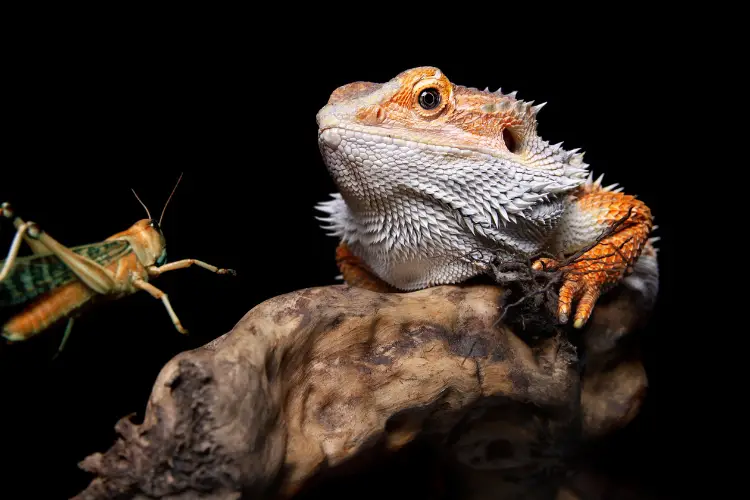
Providing a Balanced Diet
A balanced diet plays a crucial role in maintaining your bearded dragon’s health and appetite. A proper diet consists of a mix of vegetables, greens, and fruits along with high-quality insects like crickets and dubia roaches. Bearded dragons can also be fed commercial pellets formulated specifically for them.
Insects should be the primary source of protein, while vegetables and fruits should account for about 20-30% of their diet. Offer a variety of vegetables and greens such as collard greens, mustard greens, dandelion greens, squash, and bell peppers. These provide essential vitamins and nutrients to keep your beardie healthy.
Serve fruits like apples, pears, melons, and berries in moderation due to their higher sugar content. Improper diet can make your bearded dragon lethargic and lose their appetite.
Keep the right balance between protein, calcium, and phosphorus to ensure proper growth and bone health. An imbalanced diet could lead to health issues such as metabolic bone disease and impact your bearded dragon’s appetite.
Supplementing with Vitamins and Minerals
Vitamins and minerals are essential for your bearded dragon’s overall health and appetite. Some key supplements to consider include calcium, vitamin D3, and multivitamins specifically designed for reptiles.
Calcium should be dusted on their food regularly to prevent potential deficiencies and promote strong bones.
Include additional supplements such as Repti Calcium and Repashy to ensure that their nutritional needs are met. However, be cautious with the amount and frequency of supplements; over-supplementing can also lead to health issues.
It’s also essential to avoid feeding your bearded dragon toxic vegetables or insects, as this can severely impact their health and appetite. Avoid offering spinach, beets, avocado, rhubarb, and glowing insects like fireflies.
With careful attention to dietary adjustments and improvements, problems related to improper diet can be addressed, helping your bearded dragon regain their appetite and thrive in their environment.
Environmental Changes and Care
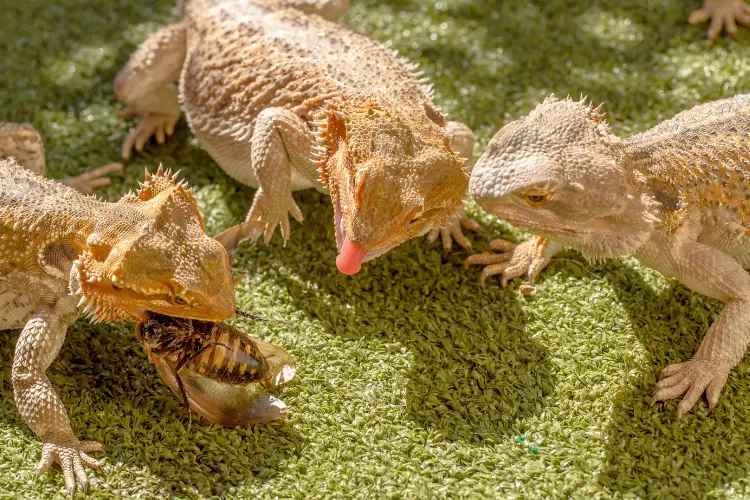
Optimizing Temperature and Lighting
Bearded dragons require proper temperature and lighting to maintain good health and appetite. Their vivarium should have a basking area with temperatures around 95-110°F (35-43°C) and a cooler area ranging from 75-85°F (24-30°C).
You can achieve this temperature gradient using heat lamps or heating pads. Ensure that the UVB light is also provided, as it plays a crucial role in their well-being.
Creating a Stress-Free Environment
Stress can cause bearded dragons to stop eating. Minimize stress by providing your pet with a secure and comfortable environment. Be mindful of any possible disturbances, such as loud noises or other pets in the vicinity. When introducing new items like decor, do so gradually to avoid overwhelming them.
Maintaining Proper Humidity
Bearded dragons are native to arid regions, so humidity levels should be kept low, ideally between 30% and 40%. Higher humidity can lead to respiratory issues and skin infections, which can affect their appetite. Use a hygrometer to monitor humidity levels and make necessary adjustments, such as using a dehumidifier or increasing ventilation.
Proper Tank Decor and Cleanliness
Setting up a proper tank decor helps create a natural and enjoyable environment for your bearded dragon, encouraging them to eat. Include the following:
- Basking spots: Provide a platform, rocks, or branches for them to bask under the heat and UVB light.
- Hiding spots: Offer caves or shelters for them to hide and feel secure.
- Climbing opportunities: Add branches and plants for climbing and exploration.
Maintaining cleanliness is also essential, as it helps prevent the growth of bacteria and parasites. Regularly clean the tank, replacing the substrate and disinfecting surfaces, water dishes, and other accessories.
By ensuring proper environmental changes and care, you can significantly improve your bearded dragon’s appetite and overall well-being.
Why Your Bearded Dragon Won’t Eat! Bearded Dragon Tips!
When to Consult a Veterinarian
Signs Your Bearded Dragon Needs Professional Help
There are several signs that indicate your bearded dragon might require veterinary intervention. As a responsible pet owner, it’s crucial to keep an eye out for any distressing symptoms in your bearded dragon.
Some key indicators that might prompt a visit to the vet include:
- Loss of Appetite: It’s normal for bearded dragons to experience occasional changes in their appetite. However, if your bearded dragon has not eaten properly for more than a few days or is losing significant amounts of weight, seeking a veterinarian’s advice is a wise decision.
- Visible Injuries: If your bearded dragon experiences any trauma, such as swelling, cuts or fractured bones, it’s important to consult a veterinarian to ensure proper treatment and care.
- Change in Behavior: Unusual behavior, such as lethargy or irritability, can be indicative of an underlying health issue. Persistent or sudden changes in your bearded dragon’s demeanor warrant a check-up with a professional.
- Changes in Physical Appearance: Keep an eye on your bearded dragon’s physical appearance. Any unexplained weight loss or gain, unusual growths or discoloration in the skin are signs that it’s time to consult a vet.
Knowing when to seek professional help is critical to keeping your bearded dragon healthy and happy. Observing its behavior and physical condition will allow you to detect any potential issues early on, and improve its chances of recovery from injuries or illnesses.
By acting promptly and consulting a veterinarian at the appropriate time, you’ll be taking the right steps toward ensuring the wellbeing of your beloved pet.
Preventing Future Eating Problems
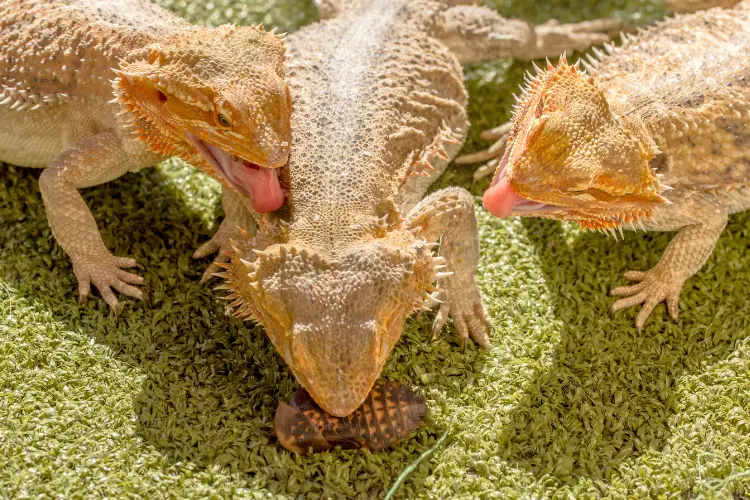
Regular Health Checkups
To ensure your bearded dragon stays healthy and maintains a proper eating routine, it is important to schedule regular health checkups with a veterinarian specializing in reptiles.
Routine visits can help detect any potential health issues before they become severe, and your vet can provide guidance on proper diet and care practices.
During checkups, the vet will assess your bearded dragon’s overall health, evaluate its weight, and may also conduct blood tests or X-rays if needed.
Monitoring Behavior and Eating Patterns
Keeping an eye on your bearded dragon’s behavior and eating patterns is crucial for preventing future eating problems. Regularly observe how much and how often your bearded dragon is eating. Changes in appetite could be a sign of stress, shedding, or more serious health issues.
Additionally, monitor your bearded dragon’s overall behavior for any signs of lethargy, aggression, or noticeable weight loss or gain.
Be sure to provide a properly balanced diet to minimize the risk of nutritional deficiencies. A healthy bearded dragon diet should include:
- A mix of live insects (e.g., crickets, mealworms, dubia roaches) and vegetables (e.g., collard greens, mustard greens, bell peppers)
- Calcium and vitamin D3 supplements to support healthy bone growth
- Occasional treats, such as fruit or waxworms, in moderation
Maintaining the appropriate living conditions for your bearded dragon will not only improve its overall health but also help prevent eating problems. The habitat should have adequate UVB lighting, optimal temperatures (basking area: 95-110°F, cooler area: 75-85°F), and humidity levels of 30-40% to ensure your bearded dragon thrives.
By regularly scheduling vet checkups and closely monitoring your bearded dragon’s behavior and eating patterns, you can help prevent future eating problems and ensure a happy, healthy life for your reptile friend.
FAQs:
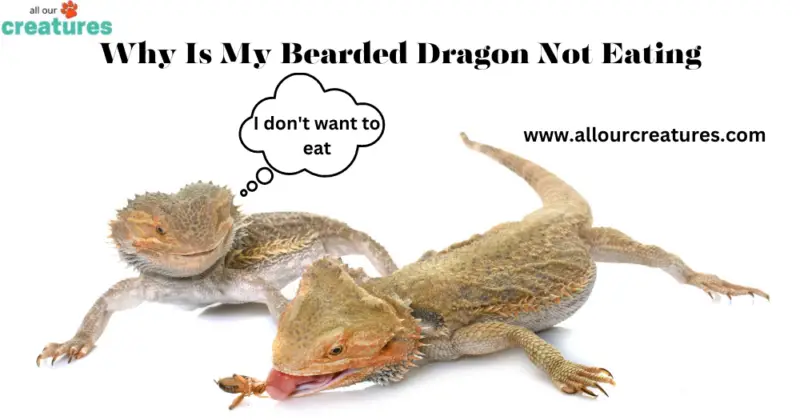
Why do bearded dragons stop eating?
Bearded dragons are usually voracious eaters, so it can be concerning when they suddenly lose their appetite. Discover the common reasons behind this behavior and what you can do to help your dragon get back on track.
How can bearded dragon owners address metabolic bone disease?
Metabolic bone disease is a serious health issue that commonly affects bearded dragons. Learn how to recognize the signs, prevent it through proper care, and provide the necessary treatment to ensure your dragon’s well-being.
What should bearded dragons eat to maintain a healthy diet?
Diet plays a crucial role in the overall health of bearded dragons. Explore the ideal food choices, including live insects and leafy greens, to create a balanced and nutritious diet for your scaly friend.
What should I do if my bearded dragon stops eating altogether?
If your bearded dragon completely loses interest in food, it may indicate an underlying health problem. Discover the potential causes and learn when it’s time to seek veterinary advice to ensure your dragon’s well-being.
How can I provide a suitable environment in my bearded dragon’s enclosure?
Creating a proper habitat for your bearded dragon is essential for their overall health. Learn about the importance of temperature, lighting, and other environmental factors to help your dragon thrive.
Bearded dragons are susceptible to various health issues, including respiratory infections, vitamin deficiencies, and mouth rot. Gain insights into recognizing the symptoms, seeking timely veterinary care, and implementing preventive measures for a healthy and happy dragon.

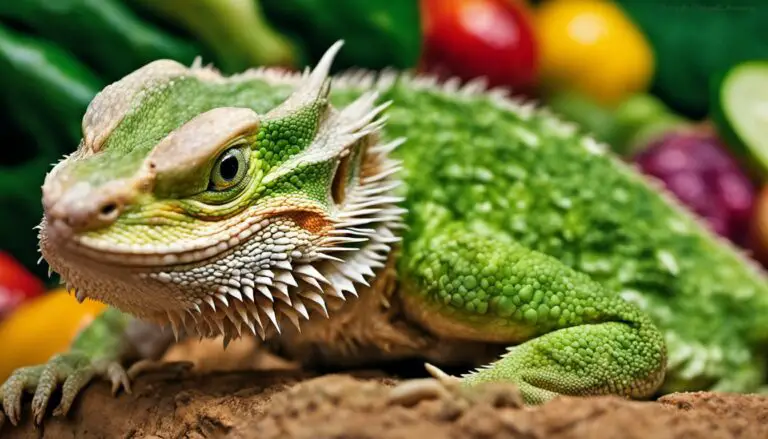
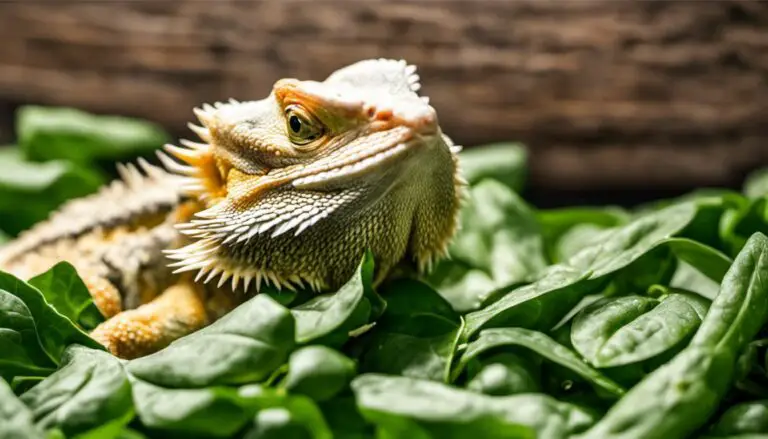
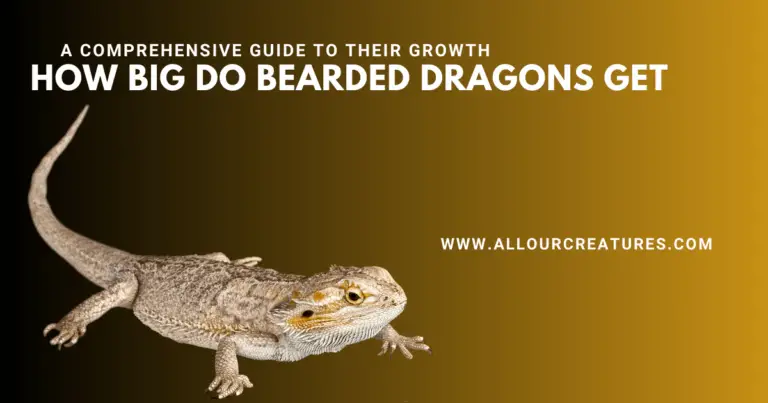
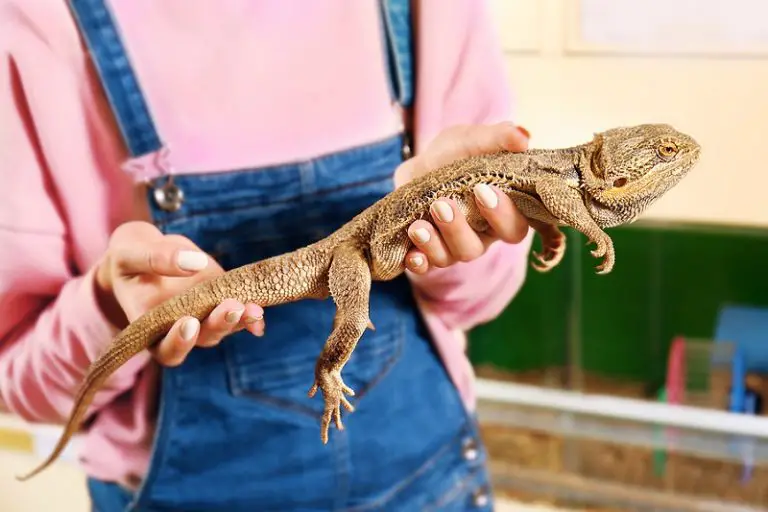
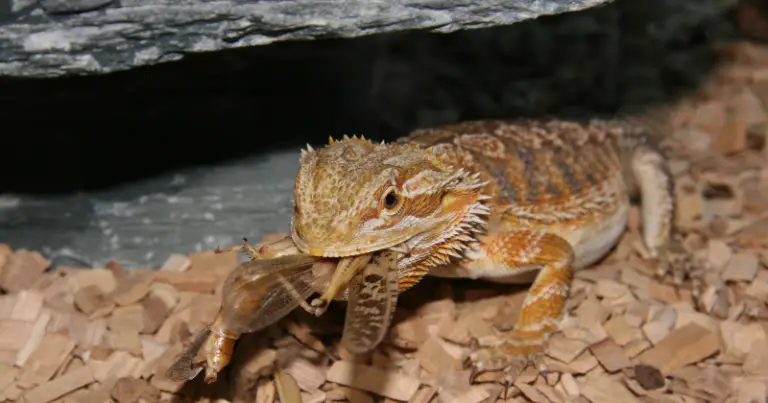
![How Many Mealworms To Feed A Bearded Dragon? [Read Now]](https://allourcreatures.com/wp-content/uploads/2021/10/How-Many-Mealworms-To-Feed-A-Bearded-Dragon-2.jpg)